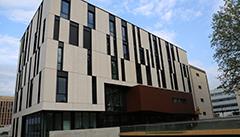
Sciences & Société
Soutenance de thèse : Florian STEINHILBER
On the use of X-ray computed tomography to investigate the influence of surface integrity on the fatigue properties of additively manufactured Ti64
Doctorant : Florian STEINHILBER
Laboratoire INSA : MATEIS
Ecole doctorale : ED34 : Matériaux de Lyon
Manufacturing defects are known to significantly impact the fatigue properties of additively manufactured (AM) components. Notably, the large surface roughness, typical of AM processes, leads to increased stress concentrations that promote crack initiation, thereby reducing fatigue resistance. Traditionally, surface roughness and related defects are evaluated using tools like white light interferometers. However, these instruments offer a limited, single-perspective and only partially three-dimensional analysis. Those limitations do not enable the thorough characterization of the complex surfaces and hidden defects typical in AM components. This study describes a methodology for performing a 3D surface analysis using X-ray Computed Tomography (XCT) data. The method is illustrated on various samples, ranging from simple cylinders to more intricate architected structures. It turns out to be very efficient at detecting critical surface defects, such as notches hidden by partially melted powder particles. The methodology is then applied to examine the effect of surface defects on the fatigue properties of Ti64 produced by Laser Powder Bed Fusion (L-PBF). This analysis includes both as-built surfaces and those subjected to post-treatments, specifically investigating the impact of Plasma electrolytic Polishing (PeP) and surface oxygen contamination (presence of an
\textalpha-case layer) resulting from high-temperature heat treatment 860°C). Using XCT for 3D characterization, defects responsible for fatigue failure are identified, the latter being predominantly surface valleys. The method's ability to predict crack initiation locations is also evaluated, as well as its potential to estimate the fatigue resistance of a specimen before testing.
Additional informations
-
Amphithéâtre Clémence Royer (bâtiment Jacqueline Ferrand) - (Villeurbanne)

